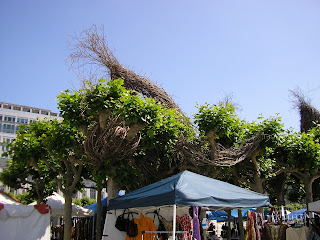I was struck this morning by an article by Conor Clarke in the Atlantic. It is titled provocatively "Why we should get rid of summer vacation," and it can be found here: links.sfgate.com/ZHJC, for my Internet friends. In it, Clarke quotes an article from the Washington Post:
"Both President Obama and Education Secretary Arne Duncan have called the traditional school day and school year outdated and inadequate for the demands of 21st century life. Students in countries that routinely outscore the United States on international tests go to school for as many as 230 days each year, 50 more than kids typically attend here. 'Go ahead and boo me,' Duncan said in April to Denver students. 'I think schools should be open six, seven days a week, 11, 12 months a year.' "
The main argument, of course, has to do with academic achievement. Most industrialized nations have school years longer than those of the United States. In Japan, it's 243 days of school; in South Korea, it's 220; in Israel, it's 216. Both Scotland and Thailand average 200 days of school per year. The United States weighs in at 180. Consider how many more things can be taught in those 63 extra days, or even those 20 extra days.
And there's no longer any rational reason for our extended summer vacations. Citing numerous studies (available as links on the Atlantic Web site), our endless summer is "a response to (1) inadequate farming schedules; (2) the mid-20th century's lack of air conditioning; (3) the mid-20th century's fear of summertime disease transmission; and (4) the no-doubt timeless desire to mimic the summertime vacation habits of the rich."
That last item is subtly important. Most students of low-income families backslide during the long summer months, forgetting stuff that they learned the year before, while children of higher-income children retain their skills, in part because their parents can afford to give them enriching experiences that keep their little neurons sharp.
So there's another unexpected reason for the educational gap between rich and poor: the long summer vacation.
Clarke also gets into an economic history of the long vacation (and, incidentally, the reason school years start in September), but that's a separate essay and it can be found here: links.sfgate.com/ZHJD.
I have my own reasons for agreeing with Clarke's thesis. Summer vacation is particularly hard on single mothers, or on families where both parents have to work full time. There are camps, of course - oh Lord, are there camps, math camps and Mandarin camps and soccer camps and drama camps and dance camps and, for all I know, worm appreciation camps. The camp business is a growth field - and not, as I understand it, a particularly well-regulated one. There are, of course, some laws, but there's hardly anyone around to enforce them. Worrisome, one might think.
And the camps cost money, an astonishing amount of money. There are scholarships available, but then there are forms to fill out and documents to file, and that's the last thing a single mom wants to do at the end of the day. Of course, relatives help, but relatives also have day jobs and vacations of their own to take.
And why are there camps? Because the summer is so very long.
And here's another thing: My granddaughter Alice likes the Charles L. Dodgson School for Valiant Children. She and I had sushi, just the two of us, the night before the last day of school. (She always orders the same thing, tekka-maki and seaweed salad, but I still think it's cool to eat raw fish next to a beloved 8-year-old. Dunno why; do anyway.)
Alice is not a dramatic child, but she did say, "Tomorrow is going to be the saddest day of my life." Now, I could have pointed out that no, it wouldn't, that life has more and larger unpleasant shocks for her. I could also have pointed out that she felt that way at the end of first grade too, and that third grade would have its own wonders, in addition to a lot of her old friends.
But that's not the point. For her, and I suspect for a lot of kids, school is actually the better time of year. It's structured, it's challenging, it's a place for friendships to grow and blossom. What with the fragmented and often half-crazed week-by-week uncertainty of summer vacation, a lot of kids would rather take a pass, except for those two weeks at the lake, if there are in fact two weeks at the lake.
No more teachers, no more books, no more teacher's dirty looks. Except I like my teacher and, candidly, I like reading, especially about horses.
(and pardon the SFgate plug on top, I couldn't get rid of it!)
 I'm heading off to yoga to find my "center" (eeeeeeek) and to
I'm heading off to yoga to find my "center" (eeeeeeek) and to





































